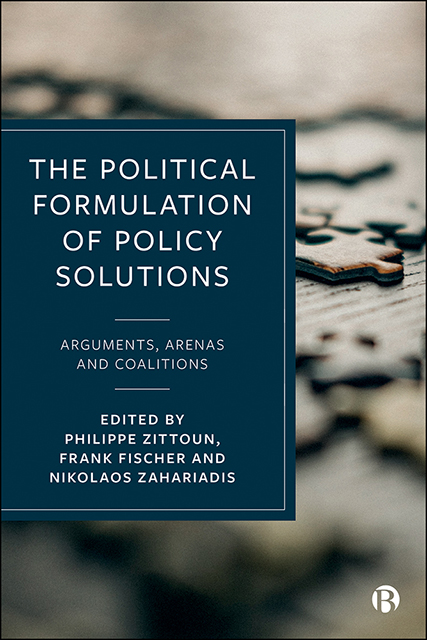Book contents
- Frontmatter
- Contents
- Notes on Contributors
- 1 Introduction – Policy Formulation: A Political Perspective
- 2 Upcycling a Trashed Policy Solution? Argumentative Couplings for Solution Definition and Deconstruction in German Pension Policy
- 3 Binding and Unbinding Problem– Solution Associations in US Agricultural Policy Making: The Introduction and Demise of Direct Payments to Farmers
- 4 The Role of Expert Reporting in Binding Together Policy Problem and Solution Definition Processes
- 5 Coalitions and Values in the Flow of Policy Solutions
- 6 The Marks of Ownership: The Promotion of Carbon Capture and Storage in France
- 7 Anticipating Public Approval in the Binding of Immigrant Integration Problems and Solutions
- 8 Discourse Coalitions and the Messiness of Policy Solutions: College Governance in Nevada
- 9 Policy Solution Ownership: Road-Space Re-Allocation as a New Approach to Urban Mobility
- Index
2 - Upcycling a Trashed Policy Solution? Argumentative Couplings for Solution Definition and Deconstruction in German Pension Policy
Published online by Cambridge University Press: 21 April 2023
- Frontmatter
- Contents
- Notes on Contributors
- 1 Introduction – Policy Formulation: A Political Perspective
- 2 Upcycling a Trashed Policy Solution? Argumentative Couplings for Solution Definition and Deconstruction in German Pension Policy
- 3 Binding and Unbinding Problem– Solution Associations in US Agricultural Policy Making: The Introduction and Demise of Direct Payments to Farmers
- 4 The Role of Expert Reporting in Binding Together Policy Problem and Solution Definition Processes
- 5 Coalitions and Values in the Flow of Policy Solutions
- 6 The Marks of Ownership: The Promotion of Carbon Capture and Storage in France
- 7 Anticipating Public Approval in the Binding of Immigrant Integration Problems and Solutions
- 8 Discourse Coalitions and the Messiness of Policy Solutions: College Governance in Nevada
- 9 Policy Solution Ownership: Road-Space Re-Allocation as a New Approach to Urban Mobility
- Index
Summary
It is obvious that old age does not everywhere start at age 65; it did not always start there where it does today; and most likely it will not start there in the future. (Gál and Monostori 2017, p 77)
Introduction
In public policy studies, today the view prevails that there are neither objective problem situations, nor can there be direct and unambiguous links from defined problems to the ‘solutions’ they require. As in Gál's and Monostori's (2017) argument cited above, the political definition of ‘problems’ (such as being old-aged) changes, and so does the definition of related solutions (such as the start of retirement age). This view is most pronounced from a ‘garbage-can perspective’ (Cohen et al, 1972), which highlights not only how problems and solutions are developed largely independently, but also how the classical ‘problem-solving logic’ may be reversed when there are solutions in search of (fitting) problems (Kingdon 1995; Zahariadis 2003). Yet while both problems and solutions do not just ‘exist’ but undergo processes of definition and construction, there is one decisive difference between the two: namely, while problems may be defined without connecting them to solutions, this is not the case vice versa. Policies, measures, and proposals are developed all the time, but they indispensably require a connection to a problem (or several ones) to become ‘solutions’.
While such problem–policy connections are crucial within the Multiple Streams Framework (MSF) whereby the policy process is conceptualized as three streams – problem, policy, and politics – the ‘coupling’ process itself has remained largely overlooked in the literature (Zahariadis 2003; Zittoun 2013). As is the case for other central elements of the MSF, it is often mentioned, but rarely elaborated on or systematically applied (Jones et al 2016). An essential element in the achievement of coupling is rhetoric (Dolan 2019) – in the achievement of ‘binding’ in particular, that is, the linking of problem and solution concepts, which precedes the linking of streams (see Chapter 1). Against this backdrop, this chapter seeks to contribute to a better understanding of (the preparation of) such ‘binding activities’ by policy actors, and the argumentative processes through which ‘measures’ or ‘instruments’ are defined into ‘policy solutions’. It therefore enlightens the first of the three epistemological dimensions distinguished in Chapter 1.
- Type
- Chapter
- Information
- The Political Formulation of Policy SolutionsArguments, Arenas, and Coalitions, pp. 21 - 44Publisher: Bristol University PressPrint publication year: 2021



